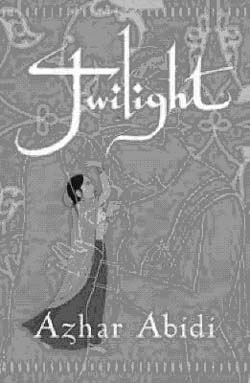Sunset, Sunrise
Chinmay Chakrabarty
TWILIGHT by Azhar Abidi image Sunset, Sunrise Chinmay Chakrabarty TWILIGHT By Azhar Abidi Penguin/Viking, New Delhi,, 2008, pp. 215, Rs. 399.00 VOLUME XXXIII NUMBER 6 June 2009 This is the second work of fiction by Azhar Abidi. His first work of fiction, Passarola Rising, was ostensibly a work of science fiction set around an imaginary event that occurred in the year 1731. Twilight, on the other hand, is more of a family account, fictitiously rendered, that begins with a marriage reception of 1985 in Karachi in Pakistan. The bride, Kate, is a young Australian who is accompanying her husband Samad to Pakistan for the first time, to meet his family and friends as well as to familiarize herself with her husband’s past. This book was earlier published in the USA under the title. The House of Bilkis, and was well received there. As Samad discovers, his mother Bilkis, her warm commodious house, and the traditions she so diligently upheld and carried forward, have all but disappeared, and exist only in the imagination. But the events narrated in the book would find an equal resonance even in South Asia, on either side of the Radcliffe Line. Many parents and uncles such as Bilkis and Sikandar live in a kind of ‘twilight’ zone, with long held notions of culture, values, and ways of living now fading away. They wait in surrender of the inevitable, buoyed only with a sense of assurance that the offspring who have flown away in search of success to the developed world would somehow fare better. Moreover, the humane face of Pakistan, as displayed by the characters of this fictional work, would no doubt endear them also to the average Indian reader. Bilkis and her barrister husband, Samad, who died seven years before 1985—the year the novel is set in—are migrants from northern India. They share aristocratic lineage, their families having links to other distinguished families of Lucknow, Hyderabad and Calcutta, where Bilkis and her two siblings were born in the ancestral house. These Indian cities and Melbourne where Samad and Kate live and which Bilkis also visits are mentioned in passing and only selected areas of Karachi have some bearing on current events. Nonetheless the cities named do have their importance in understanding the characters. The first three in India bring out the cultural roots of Bilkis and her siblings, the values and lifestyle they grew up with, and cherished. Karachi too in the beginning, as Bilkis finds, was not much different to start with but gradually became inhospitable from the late 1970s. Karachi and Murree are also associated with Samad’s fond public school memories. Samad, a new generation Pakistani, has more of Melbourne in him, the city to which his bride, Kate, also belongs. And Bilkis, as a teacher of English literature in Karachi university, the will she leaves behind providing for the care and marriage of her servants, and the books and music collections that she and her husband Hashmat so treasured, symbolize her traditional values. The political developments, though not of direct concern, come to profoundly affect the family from the late 1970s onwards. The promotion of extremist Islam, the instigation of Mohajir unrest, and of insurgency in Kashmir, all for the consolidation of political power by the military dictator, Zia ul Haq, disrupts the dreams, and aspirations of this liberal, modernist family. Bilkis herself is manhandled by Mohajir student agitators in the university. Mumtaz, the young maid is deserted by her fiancé, Omar who returns to his home in Kashmir to join the mujahidin insurgents, a call that fulfils his ideological yearnings and thus, Omar disappears forever. Bilkis never encouraged the romance of Mumtaz, but at the same time, she endorses Mumtaz’s choice and obtains a commitment from Hamida, the maid’s mother that Mumtaz should never be forced to marry anyone against her consent. Here, Bilkis did not deviate from the stand she had earlier adopted in the case of her sister Mehbano and son, Samad, both of whom chose to exercise their own choice in the matter of marriage. The book makes no reference to regional or international politics. There are no oblique references about India. Even in Omar’s ideological outbursts or in the narration of insurgency operations across the Line of Control, the Indian reader would not find anything to frown on. Rather, Omar’s death in the final action would arouse compassion. In lucid language the author ably brings forth the love, concern, and disappointments borne by Bilkis, as well as the conflict that torments Samad who is torn between attachment and obligations towards his mother and love and loyalty for Kate. Kate is also compassionate and understanding. But decisions made by the newer generation—and perhaps this is the statement Abidi makes—are more guided by rationality and logic and Bilkis, in her ‘twilight’ also rationally acquiesces in this. The narration leaves the reader enchanted, and even elevated to a spiritual plane. Abidi comes across as an artist steeped in the universality of Sufi traditions that is the common heritage of the entire subcontinent. Chinmay Chakrabarty is a retired government servant who loves reading books and reviewing them occasionally. Table of Contents >>, 2009, 215 pp., 399

